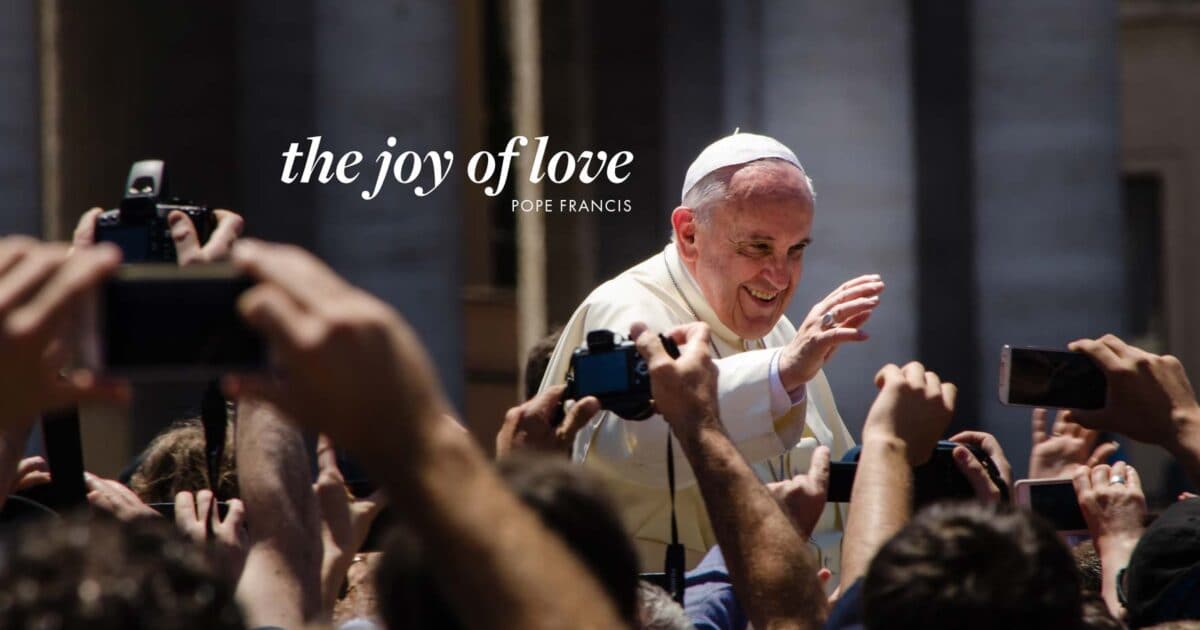Looking to Jesus: The Vocation of the Family
17 December, 2021
Amoris Laetitia Chapter 3 – The Vocation of the Family
A vocation is a calling from God, and all of us have one. In the past, the Church has tended to focus on the vocations of priesthood and religious life, but we are all called to “the fullness of Christian life and to the perfection of charity” (Lumen Gentium 40), in what has become known as the universal call to holiness. For those of us who are married and leading busy lives raising children, it can seem that we have to struggle to fit this call to holiness around our day-to-day family life. The reality is that it is actually through the daily experience of living as a family that we live out our call to follow God. This is why Pope Francis speaks of “the vocation of the family” and reminds us that in and among families the gospel message should always resound (Amoris Laetitia 58). Francis even suggests that we should approach the decision to marry and start a family with a process of vocational discernment, just as we do with priesthood and religious life.
Francis emphasises that the institution of marriage is a gift from the Lord (AL 61), not a burden that is imposed on us. As a young man, practising abstinence sometimes seemed like an arbitrary restriction that had been placed on me, and many Catholics today struggle with the Church’s teachings on divorce and contraception. It has been my experience though, that in striving to embrace these ideals of Catholic marriage, I am better able to follow Christ through my family life. What appear to be restrictions on my freedom, actually enable me to be free from my own selfish desires that hold me back from fully giving of myself in self-giving love to my wife and my children. When families truly live out their vocation they become a sign to the world of the Holy Trinity, and of the sacrificial love of Christ crucified.
Francis emphasises that Christian families are not a product of the Church, but rather the Church is a product of Christian families. Spouses build up the body of Christ and form a domestic Church, and the Church looks to the Christian family to better understand herself (AL 67). In fact, in the sacrament of marriage, the ministers of the sacrament are the man and woman who marry, rather than the priest or deacon who presides at the wedding (AL 75). This is something that our family really experienced when we were locked down due to COVID last year. Our family’s Church experience had been so focussed around attending Mass on Sunday, that when that was no longer possible, we experienced a real vacuum in our spiritual life. My wife and I realised that our home should actually be the primary experience of Church for our family, and that we needed to be intentional about making our home a domestic church. The domestic churches of our families are the building blocks of our Church, and when they flourish, they enrich the whole Church, which is herself, a family of families (AL 87).
Francis stresses the education of children as a most serious duty and primary right of parents (AL 84). Parents are called to defend this right, and no institution can claim to take it from them. I believe it’s regrettable that in our Church, there has been an unspoken expectation that if families send their children to Catholic schools and bring them to parish events then these institutions will take care of educating children and passing on the faith to them. This clearly has not been working. Francis confronts parents with the importance of our role as primary educators and calls us not to give into the temptation to simply delegate this role to others. In entering into the sacrament of marriage, spouses “become ministers of their children’s education. In educating them, they build up the Church, and in so doing, they accept a God-given vocation” (AL 85). Our schools and parishes provide a valuable role in supporting us as parents, but they can never replace the role that we have.
In this chapter Francis gives us a lot of great food for thought about the vocation of the family. I think the most important takeaway though, is not any piece of information but a fundamental shift in our attitude and perception of family life. Francis invites us to see family life in a more sacred way, and to understand the intrinsic links between family and the Church. For those of us called to this vocation, our family provides the primary means for us to journey closer to God and to our own salvation, as well as leading others to Christ, both within our family, and through our witness to others. Striving for this understand of vocation has been a wonderful and fruitful journey for my own family. I pray that all families in our diocese could come to know and embrace this special vocation.
Michael Otto
Executive Officer – Vocations, Youth & Family Life

